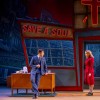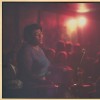

Fall Out Boy’s Joe Trohman says mosh pits were like therapy growing up
His new memoir is a candid exploration of his childhood and life as a musician.
Joe Trohman is probably best known as the guitarist and founder of the band Fall Out Boy, formed in 2001 in Wilmette, Ill. He also plays in a heavy metal supergroup called the Damned Things.
But the main focus of his new memoir isn’t his life as a musician. And it’s not about recounting behind-the-scenes tales from Fall Out Boy’s early days. Instead, None of This Rocks focuses on Trohman’s upbringing — specifically, his strained relationship with his mother and the refuge he found in punk music as a teenager.
The guitarist recently joined Reset to talk about his new book.
On discovering the punk scene in Chicago
It was interesting. I moved to Winnetka from a rural-ish part of Ohio, so that in itself was a culture shock. That’s where I got into punk rock, though there wasn’t a scene in rural Ohio. Plus, I was a kid. So there wasn’t a scene to go to. Even if there had been, I was too young to go to it.
When I got to Winnetka, I wasn’t having a good go of finding connections with other people. I made a couple of friends here and there. But the ones that I did make, were going to shows in Chicago, mainly at the Fireside Bowl, which doesn’t have shows anymore, unfortunately, as far as I know, but that used to be a nice, dingy, dirty, kind of Chicago, CBGBs type of venue and I used to just go down there as much as I could, taking the L. My parents would allow me at 14-, 15-years-old. I just made tons of friends there, even though I was the baby of the group. They welcomed me in and that kind of became my community more than Winnetka ever was.
On navigating his mother’s mental illness
I knew there was something wrong when I was pretty young. Kindergarten, maybe first grade — that’s when I started wondering why my mother was not like the nice mothers.
My dad is a cardiologist. My entire life [he] would try to explain, in the best [way] he could, that she was sick. And I had to try my best to understand that and put it into context. But that context is pretty limited when you’re a child. As I got older, [and] I started struggling with my own mental illness, I still did not make the connection. I was diagnosed as clinically depressed, honestly, like around 10. So still too young to really make those connections. It wasn’t until I was in my 20s, where I started to feel bad for [my mom.] And I also started to feel that maybe this wasn’t so much her fault, that she wasn’t so in control.
It didn’t mean what happened didn’t happen — those things happened. She did them. Nobody else did them. She caused the damage she caused. But in my 20s, I started to really realize maybe she wasn’t in control. And then all the things my father said over the years clicked. And then when I became a father — which was closer to the time that she was diagnosed terminally ill — is when I really understood how hard it must have been for her.
On performing being an emotional outlet
I didn’t have a significant amount of outlets. Yes, I was going to therapy intermittently, but I wasn’t as committed as I am as an adult to my weekly therapy. It started with hardcore music, because I go to the shows, and the mosh pits — we just call them “the pits” — people just beat the hell out of each other in those things. And it wasn’t done in a hateful manner. It was just part and parcel of the scene. And I think we were all getting out various forms of pain and aggression through that.
And then I continued through Fall Out Boy, when we first started kind of playing and for many years after, when I would just thrash my body around on stage. It was almost like performing an exorcism on myself. Every single show, I damaged my body terribly. It was painful, but it was fun to watch. I think it was a production before we had money for lights and video screens and all of that fun stuff to do all the work for us.
On fan’s perception of Fall Out Boy
I think that the fan perception is that we’re four best buds that share one big bed together and share pizza together and we just are never apart. And we’re always lovey dovey, and here’s the reality: we are friends, by the way, let me just make that clear. We don’t hate each other.
Think about if you started your career at 17 years old and then almost 22 years later you are working that same job with the exact same people. You might at times get sick of those people. And that is just a reality of being in a band for a long time.
Plenty of bands have their stories about altercations over the years, we’ve been really good about trying to keep the ship together. We’ve had our fights, but nothing that obviously [has] broken up the band. We did take a four-year break, but that was due to playing over 200 shows a year for many years and just burning us out as human beings.
This transcription was edited for clarity and brevity. You can listen to the full interview by clicking the red audio player above.
Claire Hyman is a digital engagement producer at WBEZ. Follow her @hyimclaire.
More From
Reset with Sasha-Ann Simons


Fall Out Boy’s Joe Trohman says mosh pits were like therapy growing up
His new memoir is a candid exploration of his childhood and life as a musician.
Joe Trohman is probably best known as the guitarist and founder of the band Fall Out Boy, formed in 2001 in Wilmette, Ill. He also plays in a heavy metal supergroup called the Damned Things.
But the main focus of his new memoir isn’t his life as a musician. And it’s not about recounting behind-the-scenes tales from Fall Out Boy’s early days. Instead, None of This Rocks focuses on Trohman’s upbringing — specifically, his strained relationship with his mother and the refuge he found in punk music as a teenager.
The guitarist recently joined Reset to talk about his new book.
On discovering the punk scene in Chicago
It was interesting. I moved to Winnetka from a rural-ish part of Ohio, so that in itself was a culture shock. That’s where I got into punk rock, though there wasn’t a scene in rural Ohio. Plus, I was a kid. So there wasn’t a scene to go to. Even if there had been, I was too young to go to it.
When I got to Winnetka, I wasn’t having a good go of finding connections with other people. I made a couple of friends here and there. But the ones that I did make, were going to shows in Chicago, mainly at the Fireside Bowl, which doesn’t have shows anymore, unfortunately, as far as I know, but that used to be a nice, dingy, dirty, kind of Chicago, CBGBs type of venue and I used to just go down there as much as I could, taking the L. My parents would allow me at 14-, 15-years-old. I just made tons of friends there, even though I was the baby of the group. They welcomed me in and that kind of became my community more than Winnetka ever was.
On navigating his mother’s mental illness
I knew there was something wrong when I was pretty young. Kindergarten, maybe first grade — that’s when I started wondering why my mother was not like the nice mothers.
My dad is a cardiologist. My entire life [he] would try to explain, in the best [way] he could, that she was sick. And I had to try my best to understand that and put it into context. But that context is pretty limited when you’re a child. As I got older, [and] I started struggling with my own mental illness, I still did not make the connection. I was diagnosed as clinically depressed, honestly, like around 10. So still too young to really make those connections. It wasn’t until I was in my 20s, where I started to feel bad for [my mom.] And I also started to feel that maybe this wasn’t so much her fault, that she wasn’t so in control.
It didn’t mean what happened didn’t happen — those things happened. She did them. Nobody else did them. She caused the damage she caused. But in my 20s, I started to really realize maybe she wasn’t in control. And then all the things my father said over the years clicked. And then when I became a father — which was closer to the time that she was diagnosed terminally ill — is when I really understood how hard it must have been for her.
On performing being an emotional outlet
I didn’t have a significant amount of outlets. Yes, I was going to therapy intermittently, but I wasn’t as committed as I am as an adult to my weekly therapy. It started with hardcore music, because I go to the shows, and the mosh pits — we just call them “the pits” — people just beat the hell out of each other in those things. And it wasn’t done in a hateful manner. It was just part and parcel of the scene. And I think we were all getting out various forms of pain and aggression through that.
And then I continued through Fall Out Boy, when we first started kind of playing and for many years after, when I would just thrash my body around on stage. It was almost like performing an exorcism on myself. Every single show, I damaged my body terribly. It was painful, but it was fun to watch. I think it was a production before we had money for lights and video screens and all of that fun stuff to do all the work for us.
On fan’s perception of Fall Out Boy
I think that the fan perception is that we’re four best buds that share one big bed together and share pizza together and we just are never apart. And we’re always lovey dovey, and here’s the reality: we are friends, by the way, let me just make that clear. We don’t hate each other.
Think about if you started your career at 17 years old and then almost 22 years later you are working that same job with the exact same people. You might at times get sick of those people. And that is just a reality of being in a band for a long time.
Plenty of bands have their stories about altercations over the years, we’ve been really good about trying to keep the ship together. We’ve had our fights, but nothing that obviously [has] broken up the band. We did take a four-year break, but that was due to playing over 200 shows a year for many years and just burning us out as human beings.
This transcription was edited for clarity and brevity. You can listen to the full interview by clicking the red audio player above.
Claire Hyman is a digital engagement producer at WBEZ. Follow her @hyimclaire.











